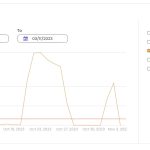Good morning. I have been tackling an issue that my hosting SIteGround flagged last week where on of my sites is using a high level of resources, specifically CPU seconds (see image attached). I did extensive troubleshooting last Friday with plugins off, rollback to previous backup of the site before the problem started on the 20th of this month. I did get the issue under control last Friday. Suddenly the graph droppded but last evening I noticed that CPU seconds had kicked up again. I put the site into maintanence mode and turned off all plugins for an hour and this seems to have calmed things done again.
I have had SiteGround support look into this as well and they tell me that there is something making a high volume of queries from the site to the products on the site. I include some of the transcript from last week and yesterday below.:
__ Last week
For the past 24 hours these are the IPs which made most requests to your site:
20922 35.207.163.157
165 51.171.111.52
15 192.0.100.186
The IP which makes most requests is 35.207.163.157, which belongs to the server. This means that there is a script/tool/plugin on your site which makes requests to the site itself. The user agents of the request is:
WordPress/6.3.2; lien caché
A small portion of the requests are made by the internal WordPress cron, so please consider adding a real cron job replacing the native one.
__
I set up the cron job.
__ Yesterday
I checked in detail and for the last 24 hours, the website letsgoastrothomastown.com used 183 397 CPU seconds. It seems the server IP: 35.207.163.157 made almost 40,000 hits to the website for that timeframe.
For some reason, different pages are requested, but these requests don't reveal the plugin that initiated them. Here are a few samples:
35.207.163.157 lien caché - [02/Nov/2023:16:46:55 +0000] "GET /product/right-back-side-b-3f/ HTTP/2.0" 200 25380 "-" "WordPress/6.3.2; lien caché" | TLSv1.3 | 1.167 1.229 1.229 MISS 0 NC:000000 UP:SKIP_CACHE_SET_COOKIE
35.207.163.157 lien caché - [02/Nov/2023:16:46:56 +0000] "GET /product/right-back-b-1a/ HTTP/2.0" 200 25414 "-" "WordPress/6.3.2; lien caché" | TLSv1.3 | 1.306 1.382 1.382 MISS 0 NC:000000 UP:SKIP_CACHE_SET_COOKIE
35.207.163.157 lien caché - [02/Nov/2023:16:46:58 +0000] "GET /product/right-back-side-b-4f/ HTTP/2.0" 200 25382 "-" "WordPress/6.3.2; lien caché" | TLSv1.3 | 1.169 1.230 1.230 MISS 0 NC:000000 UP:SKIP_CACHE_SET_COOKIE
Is there is anything in this or the example from the logs that you see as a known issue it would be appreciated.
Just so you know the main queries via views would generally be from this page:
lien caché
Although not apparent on first load, there are 17 views with a total of 417 products being presented on popups. Maybe this is a step to far? I have been running the site since July and there hasn't been an issue at other times so not sure my set up would be the problem.
